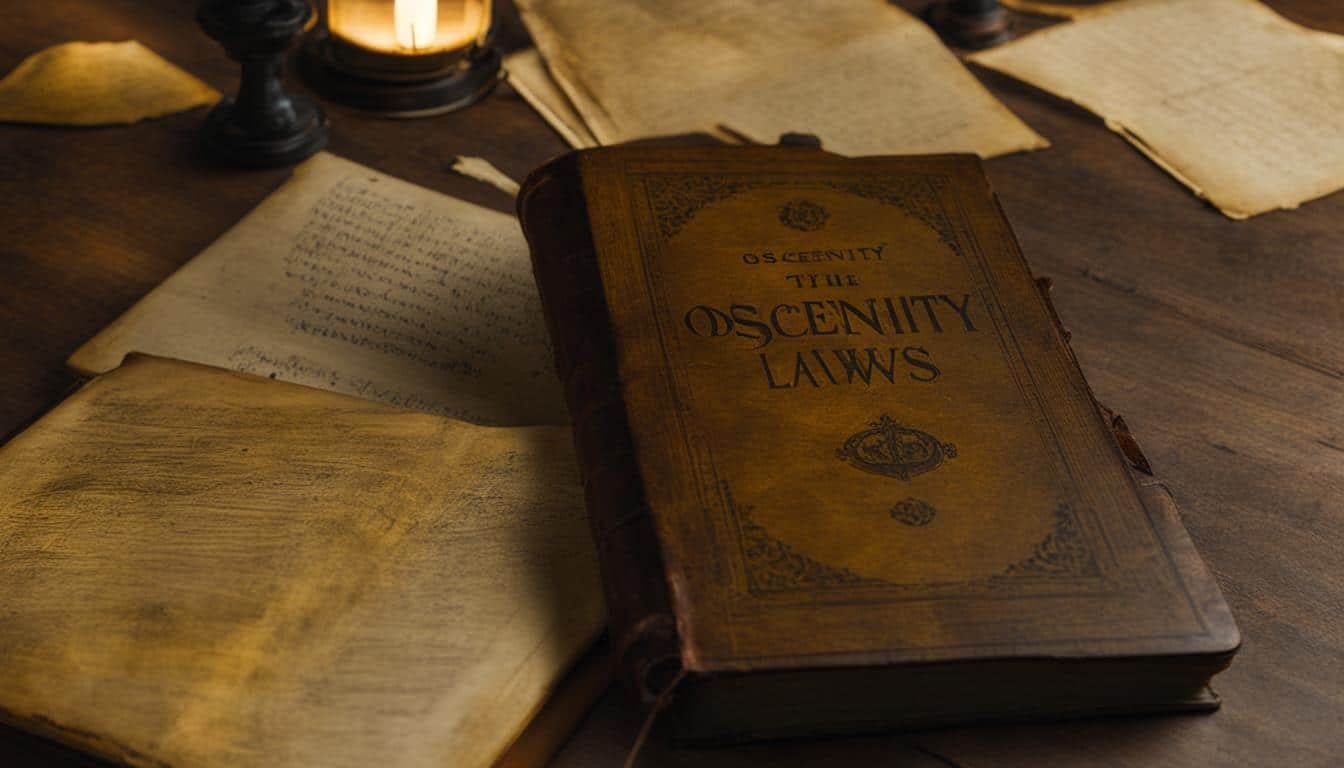When facing charges of obscenity, it is crucial to have a strong defense strategy in place. With obscenity laws varying from state to state, it is important to consult with a specialized attorney who can guide you through the legal process. To help you navigate these challenging cases, we have compiled 13 effective strategies based on the experiences of successful defense attorneys. These strategies, when implemented correctly, can significantly improve your chances of defending against charges of obscenity cases.
Key Takeaways:
- Consult with a specialized attorney to determine the most suitable defense strategies for your specific case.
- Obscenity laws vary from state to state, so it’s important to understand the specific laws applicable to your jurisdiction.
- One strategy is to dispute the obscenity of the material and challenge the legal definition of obscenity.
- Contesting the age of the individuals depicted in the material can also weaken the prosecution’s case.
- It is possible to contest possession or intent by presenting evidence of lack of knowledge or unintentional receipt of the material.
Understanding Obscenity Laws in the United States
Obscenity laws play a crucial role in regulating the sale and distribution of materials that are considered obscene, indecent, or offensive. These laws vary from state to state, making it essential to comprehend the intricacies of obscenity laws in the United States. A key element in understanding these laws is the definition of obscenity itself.
The legal definition of obscenity is not consistent across all states, but many states rely on the Miller Test as a benchmark. The Miller Test evaluates whether a work is obscene based on three criteria: whether it appeals to prurient interests, whether it depicts or describes sexual conduct in an offensive way, and whether it lacks serious literary, artistic, political, or scientific value.
It is important to note that obscenity laws are not solely governed by state legislation. There are also federal laws that pertain to obscenity, such as the Sexual Exploitation of Children Act. Familiarity with both federal and state laws related to obscenity charges is crucial to effectively defending against such charges.
“Obscenity laws are designed to strike a balance between protecting freedom of expression and preventing the dissemination of materials that are offensive or harmful to society. Understanding the nuances of these laws is essential for anyone involved in a case related to obscenity.”
By comprehending the intricacies of obscenity laws in the United States, individuals facing obscenity charges, as well as their defense attorneys, can develop a strategic defense. It is crucial to seek legal counsel from an experienced attorney who specializes in obscenity cases to navigate the complexities of these laws effectively.
| Key Points | Action Steps |
|---|---|
| 1. Familiarize yourself with the definition of obscenity. | – Research the Miller Test and understand how it is applied in different states. – Review federal laws related to obscenity charges. |
| 2. Consult with a specialized attorney. | – Seek legal counsel from an attorney experienced in obscenity cases to navigate the legal complexities. – Discuss potential defense strategies based on the specific details of your case. |
| 3. Understand the potential consequences. | – Research the penalties and potential ramifications of an obscenity conviction in your state. – Evaluate the potential impact on your personal and professional life. |
Hiring an Experienced Obscenity Defense Attorney
When facing charges of obscenity, it is crucial to hire an experienced defense attorney who specializes in obscenity cases. These attorneys possess in-depth knowledge of the legal complexities surrounding obscenity charges and can provide strategic guidance throughout the legal process. By enlisting the help of a specialized attorney, you can significantly increase your chances of mounting a successful defense.
One of the key advantages of hiring an experienced obscenity defense attorney is their track record of successfully defending clients against similar charges. They have the expertise to assess the specifics of your case, identify potential weaknesses in the prosecution’s arguments, and develop a strong defense strategy tailored to your unique situation.
Additionally, an experienced defense attorney will be well-versed in both federal and state obscenity laws. They understand the nuances and variations in these laws, ensuring that your defense is comprehensive and in compliance with all applicable regulations.
When selecting an obscenity defense attorney, consider their reputation and past successes. Look for attorneys who have a proven track record in defending clients against obscenity charges and who are respected within the legal community. By hiring an experienced attorney, you are making an investment in your defense and increasing the likelihood of achieving a favorable outcome in your case.
Disputing the Obscenity of the Material
One strategy for defending against obscenity charges is to dispute the obscenity of the material in question. This involves challenging the legal definition of obscenity and presenting arguments that the material does not meet the criteria set forth by the Miller Test or other applicable laws. An experienced defense attorney can help build a strong case by examining the content of the material, its intended audience, and its artistic or literary value.
By disputing the classification of the material as obscene, the defense aims to create doubt about its alleged offensiveness and lack of value. This strategy involves thorough analysis and research, examining the legal standards, and identifying potential weaknesses in the prosecution’s case. It is important to present evidence and arguments that demonstrate the material’s potential social, artistic, or educational significance, highlighting its literary or artistic value.
Challenging the Legal Definition of Obscenity
Challenging the legal definition of obscenity is a crucial aspect of disputing obscenity charges. The defense attorney may argue that the material does not meet the three criteria established by the Miller Test, emphasizing that it does not appeal to prurient interests, is not patently offensive, and possesses serious value. This approach requires presenting persuasive evidence and expert testimony to demonstrate that the material is not obscene under the legal standards.
In addition to the Miller Test, it may be necessary to explore other relevant legal frameworks and precedents that define obscenity. By drawing upon these alternative definitions, the defense can further establish that the material in question should not be deemed obscene. Ultimately, disputing the obscenity of the material is a crucial strategy in mounting a successful defense against charges of obscenity.
| Pros | Cons |
|---|---|
| Can create doubt about alleged offensiveness | Prosecution may present counterarguments |
| Allows for examination of artistic and literary value | Requires thorough research and analysis |
| May uncover weaknesses in the prosecution’s case | Outcome dependent on judge or jury interpretation |
Contesting the Age of Depicted Individuals
When facing charges related to obscenity, one effective defense strategy is to contest the age of the individuals depicted in the material. By challenging the claim of minor involvement, you can raise doubts about the alleged obscenity of the material and weaken the prosecution’s case. To do this, it is crucial to gather evidence that proves the individuals in question are not actually minors or that they do not appear to be minors.
This defense strategy requires careful examination of the material and consideration of various factors. You may need to present evidence such as birth certificates, identification documents, or expert opinions to demonstrate that the individuals are of legal age. Additionally, if the material in question is subjective or open to interpretation, it may be necessary to argue that the appearance of the individuals does not meet the legal definition of a minor.
Contesting the age of depicted individuals is a complex legal process that requires the expertise of an experienced defense attorney. They will be able to assess the specifics of your case, guide you through the necessary steps, and help you build a strong defense. By challenging the claim of minor involvement, you can significantly impact the outcome of your obscenity case.
| Key Points |
|---|
| Contesting the age of depicted individuals can weaken the prosecution’s case in obscenity charges. |
| Gather evidence to prove that the individuals are not minors or do not appear to be minors. |
| Present birth certificates, identification documents, or expert opinions as evidence. |
| An experienced defense attorney is crucial to navigating this complex legal process. |
Contesting Possession or Intent
One effective strategy in defending against obscenity charges is to dispute the possession of the allegedly obscene material and challenge the intent to distribute. By presenting evidence that you did not knowingly possess the material or had no intention to distribute it, you can cast doubt on the prosecution’s case. Your defense attorney can help you gather evidence and build a strong case to contest possession or intent.
It is crucial to demonstrate that you had no knowledge about the content of the material in question. This can be done by proving that the material was unknowingly received or that there was a lack of awareness of its nature. By highlighting your lack of knowledge, you undermine the prosecution’s argument that you intentionally possessed or intended to distribute the material.
When contesting possession or intent, your defense attorney will carefully examine the circumstances surrounding your case. They will consider factors such as how the material was acquired, whether it was shared with others, and any evidence that suggests a lack of intent to distribute. With their expertise in obscenity law, your attorney will craft a compelling defense strategy to protect your rights and challenge the prosecution’s case against you.
| Defense Strategy | Benefits |
|---|---|
| Disputing possession | – Raises doubts about your knowledge of the material – Weakens the prosecution’s case |
| Challenging intent to distribute | – Undermines the claim that you had the intention to distribute – Casts doubt on the prosecution’s allegations |
| Proving lack of knowledge | – Demonstrates your lack of awareness about the material – Raises questions about your intent |
By contesting possession or intent, you are exercising your right to defend yourself against obscenity charges. It is crucial to work closely with an experienced defense attorney who can guide you through the legal process, build a strong case, and ensure that your rights are protected.
Breaches of Constitutional Rights
In the defense against charges of obscenity, one effective strategy is to argue breaches of constitutional rights during the investigation or evidence collection. The defense may assert violations of the Fourth Amendment, which safeguards against unreasonable searches and seizures, or other encroachments on the accused’s constitutional rights throughout the legal process. Successful arguments in this regard can lead to the exclusion of evidence, thereby weakening the prosecution’s case.
When challenging constitutional breaches, it is crucial to thoroughly examine the circumstances surrounding the investigation and evidence collection. Any misconduct or disregard for the accused’s rights can be raised as a significant legal issue, potentially resulting in the dismissal of charges or a favorable outcome.
The defense attorney may scrutinize whether the search and seizure of the alleged obscene material adhered to legal requirements, such as obtaining a proper warrant, respecting privacy rights, and ensuring reasonable suspicion or probable cause. Any violations in these areas can significantly impact the admissibility of evidence.
Additionally, the defense may argue against infringements on the accused’s rights during the investigation. It is essential to review every aspect of the legal process to identify any instances where the accused’s constitutional rights may have been violated, such as coerced confessions, denial of legal counsel, or procedural errors. By strategically presenting these violations, the defense can undermine the prosecution’s case and strengthen the chances of a positive outcome for the accused.
| Constitutional Rights Breaches | Impact |
|---|---|
| Unreasonable searches and seizures | Exclusion of evidence, weakening prosecution’s case |
| Infringements on the accused’s rights during investigation | Raise doubts about the validity and reliability of the evidence |
| Misconduct in obtaining warrants or violating privacy rights | Potential dismissal of charges or suppression of evidence |
It is important for the defense team to thoroughly investigate and gather evidence related to any potential breaches of constitutional rights. This requires a comprehensive understanding of the law and the ability to identify and challenge violations during all stages of the legal process. By strategically leveraging constitutional rights arguments, the defense can significantly strengthen their case and enhance the chances of a favorable outcome for the accused.
Understanding Pertinent Federal Criminal Laws
When facing charges of obscenity, it is crucial to have a thorough understanding of the federal criminal laws that are relevant to your case. In addition to obscenity laws, there are other federal statutes that may come into play, particularly those related to the sexual exploitation of children. Familiarizing yourself with these laws will not only help you navigate the legal landscape but also allow for the development of a comprehensive defense strategy.
One such federal law is the Sexual Exploitation of Children Act, which makes it illegal to produce, distribute, or possess materials involving the sexual exploitation of minors. This law is aimed at protecting children from exploitation and ensuring that those who engage in such activities are held accountable. Understanding the specific provisions of this law is essential when defending against obscenity charges that involve the alleged sexual exploitation of children.
Another federal law that may be relevant to your case is the transportation or possession of material involving the sexual exploitation of minors. This law prohibits the transportation, shipping, receiving, or possessing of materials that contain visual depictions of minors engaged in sexually explicit conduct. If you are facing charges related to the possession or distribution of such materials, it is crucial to be aware of the specific provisions of this law and how they may impact your defense strategy.
By having a clear understanding of these federal criminal laws, you can work closely with your defense attorney to build a strong defense strategy that takes into account the specific charges you are facing. It is important to consult with an experienced attorney who specializes in obscenity cases to ensure that you are well-informed and prepared to navigate the complexities of federal law.
| Federal Criminal Laws Pertinent to Obscenity Charges |
|---|
| Sexual Exploitation of Children Act |
| Transportation or Possession of Material Involving the Sexual Exploitation of Minors |
The Importance of Early Intervention and Legal Consultation
When facing charges of obscenity, it is crucial to take immediate action and seek legal consultation as early as possible. Early intervention can significantly impact the outcome of your case and may provide opportunities for a strong defense strategy.
An experienced defense attorney specializing in obscenity cases can provide invaluable guidance and support throughout the legal process. From the moment you consult with an attorney, they can assess the details of your case, gather relevant evidence, and begin developing a robust defense strategy tailored to your specific situation.
Waiting too long to seek legal counsel can be detrimental to your defense. By acting promptly, you can mitigate potential complications and ensure that your rights are protected from the outset. An attorney skilled in obscenity law can navigate the complexities of the legal system on your behalf, advocating for your best interests every step of the way.
Remember, early intervention and legal consultation are vital when facing charges of obscenity. By hiring an attorney early in the process, you give yourself the best possible chance at a favorable outcome. Take control of your defense and secure the guidance you need to protect your rights and build a strong case.
Source Links
- https://www.libertybelllaw.com/obscenity/
- https://www.ncbi.nlm.nih.gov/pmc/articles/PMC5231412/
- https://www.muscalaw.com/blog/defending-against-obscene-visual-representations-child-sexual-abuse-charges







